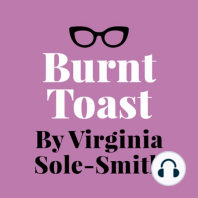29 min listen
"That's Unethical as Hell."
ratings:
Length:
53 minutes
Released:
Jul 1, 2021
Format:
Podcast episode
Description
Hello and welcome to another audio version of Burnt Toast! This is a newsletter where we explore questions, and some answers, about fatphobia, diet culture, parenting and health. I’m Virginia Sole-Smith. I’m a journalist who covers weight stigma and diet culture, and the author of The Eating Instinct and the forthcoming Fat Kid Phobia. I’m so excited today to introduce my guest, Marquisele Mercedes, or Mikey. She is a writer and doctoral student from the Bronx who is completing her PhD at Brown University School of Public Health, specializing in weight stigma, racism and critical public health studies. And oh my goodness, we need her work so much. I’m putting Mikey’s Patreon right here at the top of the transcript, because I hope everyone reading/listening will check it out and support her work. Welcome, Mikey. Thank you for being here.Mikey Thank you for having me!VirginiaThe first thing we have to talk about is the piece you did a couple weeks ago, a brilliant, searing takedown of Wegovy, the newest FDA-approved weight loss drug. Honestly, anyone who hasn’t read it yet, go read Mikey’s piece. One of the things that really jumped out to me is how the diet industry finances these drugs, because whenever we see these headlines, it’s presented as unequivocally good news. People may sort of know that scientists are required to disclose whether they have a financial stake in the research they’re doing, but—I have been reporting on this stuff for a really long time and I don’t even totally understand all the ways that the financial disclosure on a study does not tell the whole story. So why don’t you walk us through that a little bit.What does a financial disclosure do? And what does it tell us? What does it not tell us? And why, in the case of Wegovy, is there just so much more money at stake?Mikey The first thing to know is that to publish in most journals—especially those that have biomedical research—any journal that you try to publish in, if it’s peer reviewed, will ask if you have any financial conflicts of interest. But people who aren’t familiar with that process usually don’t understand that there isn’t a point at which the journal editors will say, “Oh, you have too much of a vested interest. We’re not going to take this article.” That doesn’t really happen. So, for example, there are three different authors on that Wegovy study that are employees of Novo Nordisk and then there’s also two that additionally hold stock, and that was not enough to not have this paper published.VirginiaSo it’s like: We’ll disclose it, but we’ll go right ahead and report this as unbiased science.Mikey Honestly, with a lot of areas of research, especially pharma or biomedical tech or whatever, having corporate ties is not a thing people really question. It’s definitely not a thing that journal editors question because it’s normal. So people are like, oh, okay, you’re a stock-owning employee of this of this pharmaceutical company. And you also receive fees from whatever and you invest actively in these companies, okay, we’ll note it at the bottom of this article. But it’s not like we’re not going to take your research, especially when it’s something like this. So there’s a lot of publication bias at work here too where, the medication had such distinct results, you know, an average of 15% loss of weight from participants’ initial weights, and a lot of people lost a third of their initial weight. When you have a result like that, it’s almost impossible for that to not get published, even in a journal like the New England Journal of Medicine, which is one of the most prestigious journals in the world.So you have publication bias on your side, because you got positive results, and no one in this area is really going to question whether or not to publish this on the basis of your financial conflicts of interest, they’re just going to note the conflicts of interest, and then go on and publish it anyway. On top of that, you have this culture within
Released:
Jul 1, 2021
Format:
Podcast episode
Titles in the series (100)
Reclaiming Pasta with Anna Sweeney by Burnt Toast by Virginia Sole-Smith
